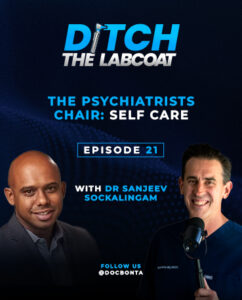When it comes to skincare, most of us are just trying to survive. Between acne, wrinkles, and the occasional sunburn, the world of dermatology feels like a mix of alchemy and rocket science. To untangle the myths and teach us a thing or two, I had the pleasure of chatting with Dr. Renita Ahluwalia, lead dermatologist at the Canadian Dermatology Centre in Toronto. From sunscreen to acne lasers, we covered it all—plus, why you probably won’t end up looking like Garfield.
The Sunscreen Debate: Rick Rubin vs. Science
You’ve heard the claims: “I don’t need sunscreen; the sun is good for me!” Music producer Rick Rubin swears by it. But science? Not so much.
Dr. Ahluwalia didn’t mince words: sunburn and excessive sun exposure lead to skin cancer. There’s a mountain of data proving that sunscreen (SPF 30 or higher) reduces your risk of skin cancer and slows down aging. The myth of “the sun is good for your skin” doesn’t hold up under scrutiny. Sure, sunlight can help regulate your circadian rhythms and provide Vitamin D, but prolonged, unprotected exposure? That’s just asking for trouble.
Her take: Sunscreen is non-negotiable. And yes, SPF is the friend that helps you age less disgracefully.
Retinol: The Anti-Aging Superhero (with a Side of Patience)
Retinol isn’t just a fancy ingredient in your overpriced night cream. It’s a molecule with a brain. Dr. Ahluwalia broke down its benefits:
- Boosts collagen production
- Reduces pigmentation
- Smooths fine lines
But retinol is no quick fix. Dr. Ahluwalia likened it to a long-term investment: expect irritation in the beginning (redness, dryness), but stick with it. Use sparingly, moisturize like your life depends on it, and watch your skin transform over months, not days.
Pro tip: Don’t start a retinol regimen on your two-week tropical vacation. Unless you enjoy looking like a lobster.
Acne 101: It’s Not Just for Teenagers
If you thought acne was something you left behind with your high school locker, think again. Dr. Ahluwalia sees more women in their 20s and 30s battling hormonal acne than teenagers.
The culprits? Hormones, stress, and yes, bacteria.
Her prescription for clear skin includes:
- A solid skincare routine (cleanser, moisturizer, SPF).
- Active ingredients like retinol, salicylic acid, or alpha hydroxy acids.
- Oral treatments for more severe cases (antibiotics, hormonal therapies, and even isotretinoin a.k.a. Accutane).
And no, chocolate doesn’t cause acne. But if your body doesn’t love certain foods, it might be worth cutting them out.
Do Nothing, Age Naturally? Sure, But with Scars
“Will acne just go away if I ignore it?” I asked.
Sure, said Dr. Ahluwalia. But it leaves scars. And those scars can last a lifetime, both on your skin and your self-esteem.
The good news? Dermatology has evolved. From radio frequency micro-needling to CO2 lasers, there’s a treasure trove of treatments to reduce scarring. But prevention is better (and cheaper) than cure.
Injectables: Fear Not the Frozen Face
Botox and fillers often get a bad rap thanks to overzealous applications. But Dr. Ahluwalia assured me: when done right, injectables are subtle and effective.
“The best injectable is undetectable,” she said.
Here’s what you need to know:
- Botox relaxes muscles to prevent wrinkles.
- Fillers restore volume and lift sagging skin.
- Collagen stimulators boost your skin’s natural rejuvenation.
Think of these as part of a 360-degree plan that includes sunscreen, skincare, and lasers. The goal? To age gracefully, not unnaturally.
Learn more:
- https://www.asds.net/skin-experts/skin-treatments/injectables
- https://www.canada.ca/en/health-canada/services/medical-procedures/cosmetic-injections.html
Hair Today, Gone Tomorrow? Not Necessarily
As someone facing the dreaded receding hairline, I couldn’t resist asking about hair transplants. Turns out, it’s a game of “keeping and replacing.”
- Keep: Topical treatments like minoxidil (Rogaine), PRP (platelet-rich plasma) injections, and even fancy red-light helmets.
- Replace: Hair transplants, using follicles from the back of your head (not your chest, as I’d hoped).
Oh, and no, you can’t get John Stamos’ hair. Your body would reject it.
Top 3 Dermatology Truths Dr. Ahluwalia Tells Everyone
- Wear sunscreen. Every day. Rain or shine.
- Think big picture. Focus on 360-degree care for natural, balanced results.
- Moisturize properly. Unscented moisturizer on damp skin is key.
Bonus advice? Stop using scented products and fabric softeners—they’re murder on your skin barrier.
What About Aging Gracefully? 
Dr. Ahluwalia emphasized that skincare isn’t about stopping time; it’s about looking and feeling your best at every stage of life. Whether you’re into lasers and injectables or just want to perfect your sunscreen game, the choice is yours.
One thing’s for sure: if you’re partying like a rock star (smoking, drinking, and skipping sleep), your skin will betray you.
Final Thoughts
From acne and sun protection to the nuances of Botox, Dr. Ahluwalia’s advice boils down to this: good skin is an investment. Start with the basics—sunscreen, retinol, a good moisturizer—and build from there.
And while Garfield hair might be a pipe dream, great skin is within reach for all of us.
Dr. Mark Bonta is a general internist, proud dad of four, and the host of the Ditch the Labcoat Podcast. When he’s not podcasting, he’s probably trying to remember where he left his sunscreen.


